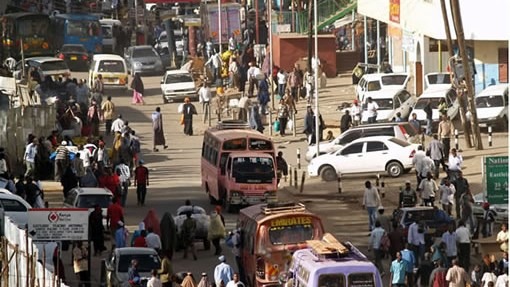
The Kenyan government’s recent decision to suspend the Hawala informal cash transfer system, which is used mainly by the Somali expatriate community, is already taking a bite out of business in Nairobi’s Eastleigh district.
“The closure has been hugely felt,” Ahmed Mohamed, secretary-general of the Eastleigh Business Community, told The Anadolu Agency.
In the Eastleigh district, commonly known as “little Mogadishu” due to its large Somali population, the impact of the move was felt immediately. At the entrance of all Somali-owned money transfer companies, notes could be seen informing customers of the indefinite closure. “We have inconvenienced many customers,” Rashka Dugal, who works at a local hawala, told AA. “The government should have done more investigations [before taking the decision]. This is a blanket punishment for all Somalis,” he insisted.
“We are losing out on business. I believe my company is innocent,” said Dugal. Eastleigh’s history dates back to Kenya’s colonial era, when the district was built specifically to accommodate Kenyans of South Asian descent. Later, Kenyan Somalis began settling in the area, followed by Somali refugees fleeing the civil war that broke out in their country in 1990. Many enterprising Somali refugees set up shop in the district, selling everything from food and clothing to electronics and jewelry.
The good prices attract many customers to the area, especially newlyweds, while traders come from as far afield as South Sudan, Uganda, Tanzania and Ethiopia to do business. The thriving commercial district is estimated to do up to $100 million in business each month.
Much of the business is started with money received from the Somali diaspora and businesses run by Somali nationals. “We survive on the money sent to us through Hawalas,” Abdifatah Osman, a Somali national living in Eastleigh, told AA. He had been expecting $1,800 to be sent through a funds transfer company one day before the closure. “The money – from my brother in Toronto – was to meant to pay the rent, meet the fee balance and buy food,” fumed Osman. “Now we’re stuck.” According to the UN’s High Commissioner for Refugees (UNHCR), there are currently 423,153 registered Somali refugees in Kenya. All businesses – from designer clothing sales to Khat, a local narcotic – have been affected by the move, according to locals. All buses plying routes in the northeastern part of the country, meanwhile, have been grounded by the government. “Buses to Garissa are not operating now,” said Mohamed of the Eastleigh Business Community.
“This means hundreds of drivers, conductors and cleaners are now jobless,” he lamented. Mohamed, on behalf of other Kenyan Somalis and Somali businessmen, urged the government to reconsider the decision. “We demand that the hawalas be permitted to operate immediately,” he told AA. Kenyan Cabinet Secretary for Defense Rachael Omamo, for her part, defended the measure. “Actions taken yesterday are fully consistent with international law and domestic law, especially with the UN Security Council resolution on the financing of terrorism,” she said.